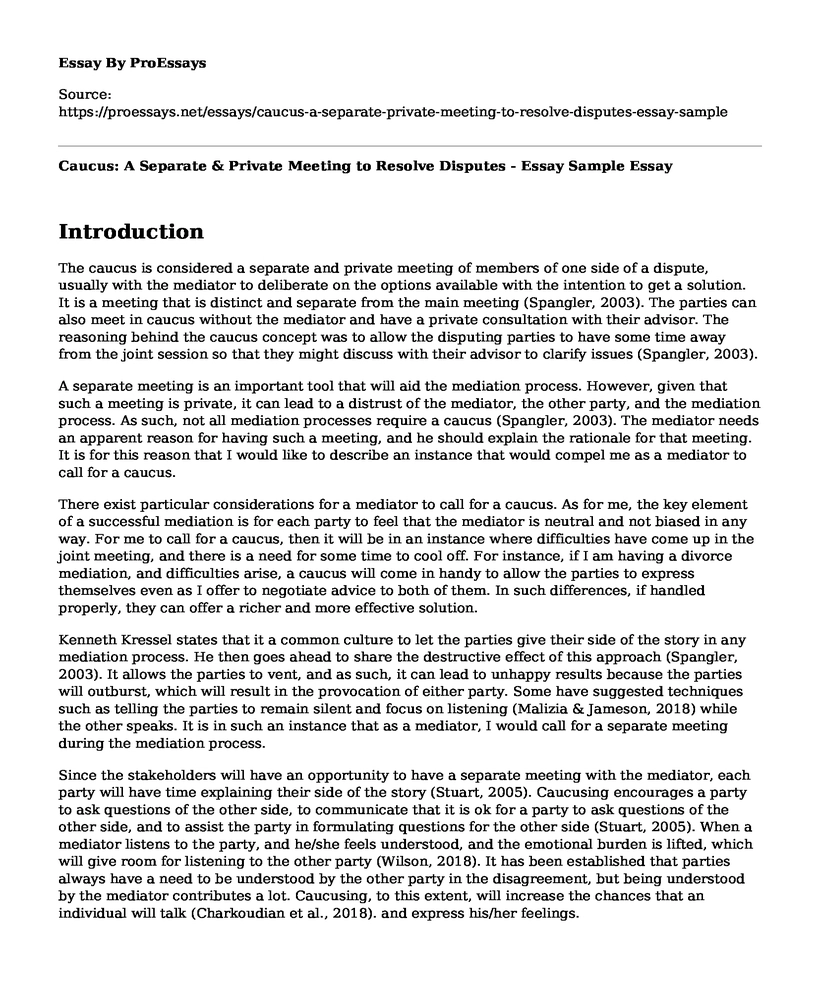Introduction
The caucus is considered a separate and private meeting of members of one side of a dispute, usually with the mediator to deliberate on the options available with the intention to get a solution. It is a meeting that is distinct and separate from the main meeting (Spangler, 2003). The parties can also meet in caucus without the mediator and have a private consultation with their advisor. The reasoning behind the caucus concept was to allow the disputing parties to have some time away from the joint session so that they might discuss with their advisor to clarify issues (Spangler, 2003).
A separate meeting is an important tool that will aid the mediation process. However, given that such a meeting is private, it can lead to a distrust of the mediator, the other party, and the mediation process. As such, not all mediation processes require a caucus (Spangler, 2003). The mediator needs an apparent reason for having such a meeting, and he should explain the rationale for that meeting. It is for this reason that I would like to describe an instance that would compel me as a mediator to call for a caucus.
There exist particular considerations for a mediator to call for a caucus. As for me, the key element of a successful mediation is for each party to feel that the mediator is neutral and not biased in any way. For me to call for a caucus, then it will be in an instance where difficulties have come up in the joint meeting, and there is a need for some time to cool off. For instance, if I am having a divorce mediation, and difficulties arise, a caucus will come in handy to allow the parties to express themselves even as I offer to negotiate advice to both of them. In such differences, if handled properly, they can offer a richer and more effective solution.
Kenneth Kressel states that it a common culture to let the parties give their side of the story in any mediation process. He then goes ahead to share the destructive effect of this approach (Spangler, 2003). It allows the parties to vent, and as such, it can lead to unhappy results because the parties will outburst, which will result in the provocation of either party. Some have suggested techniques such as telling the parties to remain silent and focus on listening (Malizia & Jameson, 2018) while the other speaks. It is in such an instance that as a mediator, I would call for a separate meeting during the mediation process.
Since the stakeholders will have an opportunity to have a separate meeting with the mediator, each party will have time explaining their side of the story (Stuart, 2005). Caucusing encourages a party to ask questions of the other side, to communicate that it is ok for a party to ask questions of the other side, and to assist the party in formulating questions for the other side (Stuart, 2005). When a mediator listens to the party, and he/she feels understood, and the emotional burden is lifted, which will give room for listening to the other party (Wilson, 2018). It has been established that parties always have a need to be understood by the other party in the disagreement, but being understood by the mediator contributes a lot. Caucusing, to this extent, will increase the chances that an individual will talk (Charkoudian et al., 2018). and express his/her feelings.
It is also impossible for a mediator to help individuals who don't talk about "where it hurts." Mediators have the chance to show empathy in the caucus without bringing up jealousies in the other party. In the absence of the other party, a party in the caucus is likely to be less tense, defensive, and angry, and more creative (Stuart, 2005). The privacy caucus will also help me as a mediator to interact more with the parties and give a reasoned solution. The caucus also helps in exploring ideas for a possible settlement in a safe and private setting (Stuart, 2005).
Conclusion
In conclusion, when caucusing is employed within a transformative framework, more effective results will be achieved. As a mediator, I will use a caucus in a manner which will not only avoid the problem-solving challenges but build transformative momentum in the process of mediation.
References
Charkoudian, L., Walter, J. L., & Eisenberg, D. T. (2018). What works in custody mediation? Effectiveness of various mediator Behaviors. Family Court Review, 56(4), 544-571. Doi: 10.1111/fcre.12375
Malizia, D. A., & Jameson, J. K. (2018). Hidden in plain view: The impact of mediation on the mediator and implications for conflict resolution education. Conflict resolution quarterly, 35(3), 301-318. Doi: 10.1002/crq.21212.
Spangler, B. (2003). Caucus: Beyond intractability. Guy Burgess and Heidi Burgess. Conflict Research Consortium, University of Colorado, Boulder. http://www.beyondintractability.org/essay/caucus/
Stuart M. I. (2005). Two Dozen Reasons for using caucuses in facilitative mediation. files.ali-aba.org/thumbs/.../PLIT_PLIT0511-ISRAEL_thumb.pdf
Wilson, B. (2018). In search of family mediation virtue ethics: picking through the undergrowth. ISSN 3391754.
Cite this page
Caucus: A Separate & Private Meeting to Resolve Disputes - Essay Sample. (2023, May 23). Retrieved from https://proessays.net/essays/caucus-a-separate-private-meeting-to-resolve-disputes-essay-sample
If you are the original author of this essay and no longer wish to have it published on the ProEssays website, please click below to request its removal:
- Essay Sample on Social Media: Globalization's Engine - Impact of 4th Industrial Revolution
- Essay Example on Analyzing Community Challenges: A Necessity of Life
- Job Satisfaction & Organizational Justice: A Study of UAE Employees - Essay Sample
- Essay Example on Performance-Based Pay: Merit, Recognition, Incentives & Earnings
- Unlocking the Macroeconomic Potential of Colombia - Essay Sample
- Syria Crisis: Fights, IS Takeover, & Foreign Interventions - Essay Sample
- Essay on Globalization: Response to Issues & Challenges in Contemporary Society







